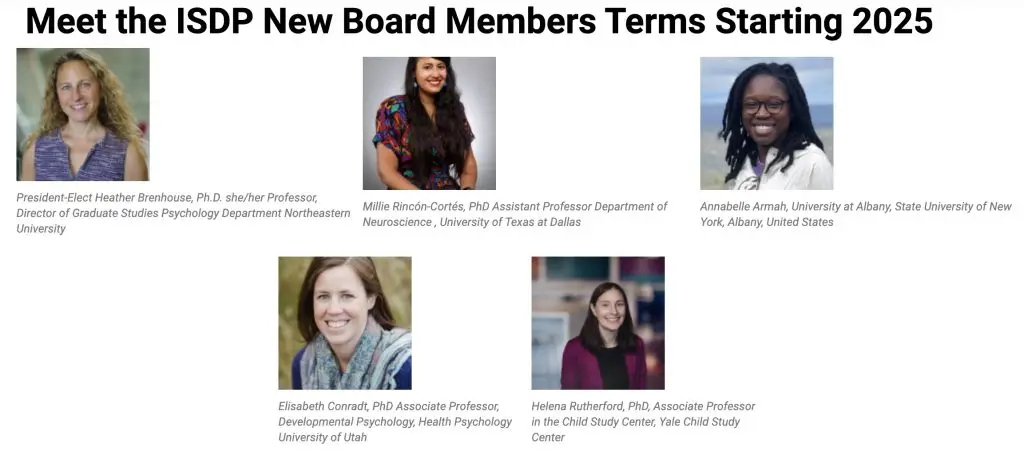Meet the ISDP New Board Members Terms Starting 2025





President-elect (1-year term followed by 2-year term as Treasurer)
Heather Brenhouse, PhD she/her
Professor, Director of Graduate Studies
Psychology Department
Northeastern University
Dr. Heather Brenhouse is Professor of Psychology at Northeastern University, where she directs the Developmental Neuropsychobiology Lab. She has served on the ISDP Governing Board since 2022, and has been honored to help further the organization’s mission of encouraging and disseminating science related to perinatal development, childhood, and adolescence—all critically important for a comprehensive understanding of the brain and behavior. She has also served on the Women’s Task Force as a member of the American College of Neuropsychopharmacology (ACNP), and is a member of the Society for Behavioral Neuroendocrinology (SBN).
Dr. Brenhouse received her B.S. from Binghamton University, working with the late Dr. Linda Spear. She received a Master’s degree from Rutgers University under Dr. Judy Stern, and a Ph.D. from Northeastern University under Dr. Jim Stellar. She conducted her postdoctoral fellowship at Harvard Medical School working with Dr. Susan Andersen. Her current research program uses behavioral, molecular, and neuroimaging strategies to investigate how early-life experience affects periadolescent development of threat processing systems, including brain and immune signaling. Dr. Brenhouse has received two Young Investigator Awards from the Brain and Behavior Research Foundation, has been funded by NICHD, and is currently funded by NIMH. She has been honored to train and mentor future developmentalists in her own lab and around the world, and she is excited to support the ISDP mission of training the next generation of scientists to use developmental perspectives.
Dr. Brenhouse is committed to inclusive and accessible professional development for young investigators. She highly values the showcasing of data from preclinical and basic research alongside translational and human research, with a firm belief that diversity of perspectives, backgrounds, and research models is a necessity on boards and decision-making groups within our society.
Board Member (3-year term)
Millie Rincón-Cortés, PhD
Assistant Professor
Department of Neuroscience
University of Texas at Dallas
https://labs.utdallas.edu/madrelab/
Millie Rincón-Cortés is an Assistant Professor in the Department of Neuroscience at the University of Texas at Dallas. She received her Ph.D. from the New York University School of Medicine under the supervision of Regina Sullivan in 2015 and completed postdoctoral training in the laboratory of Anthony Grace at the University of Pittsburgh in 2020. She runs the Developmental and Maternal Neurobiology lab, which examines normative and adversity-induced plasticity of motivational and reward-related behavioral and brain function across the lifespan.
Millie’s involvement in ISDP began when she attended as a graduate student in 2010. ISDP was the first scientific conference she ever attended! Millie received the ISDP Dissertation Award in 2015 for her work examining the role of early life trauma in shaping later life depressive-like behavior and amygdala dysfunction. Millie is passionate about developmental behavioral neuroscience and her return to the developmental psychobiology field. Her current research examines the intergenerational effects of maternal adversity on both male and female offspring and is funded by K01 and R03 grants from the NIMH and the NICHD.
Associate (Student) Member (2 Year Term)
Annabelle Armah
University at Albany, State University of New York
Albany, United States
I am a fourth-year Clinical Psychology Ph.D. student at the University at Albany, SUNY working with Dr. Betty Lin in the Family and Baby Development Lab. My research explores how parental experiences shape children’s developmental trajectories through psychobiological mechanisms, as well as the protective role of cultural and contextual factors in racially/ethnically minoritized families. I am passionate about expanding representation for minoritized participants and researchers in developmental science and believe the interdisciplinary and collaborative nature of ISDP provides an optimal context for this work. In the Student Member Representative role, I hope to collaborate with ISDP students and trainees from diverse backgrounds to support their professional goals and advocate for relevant and inclusive training experiences.
Conference Coordinator-elects (1-year term followed by 3-year terms as Conference Coordinators)
Elisabeth Conradt, PhD
Associate Professor in Psychiatry at Duke University
Dr. Conradt is a clinical psychologist with expertise in developmental programming of early childhood social and emotional outcomes. She has participated in ISDP since 2017 when she received the Kucharski Young Investigator Award. She earned her Ph.D. in clinical psychology at the University of Oregon, where she studied the biobehavioral development of infants reared in poverty. She completed her clinical internship in early childhood mental health at the Children’s Hospital of Philadelphia. Her postdoctoral work at Brown University focused on understanding the biological embedding of early life stress in children with prenatal substance exposure. Her research aims to identify modifiable mechanisms in the perinatal period that may increase risk for social and emotional challenges in early childhood. She and her collaborators then target these mechanisms for early intervention. The goal of this research is to leverage this science to prevent intergenerational transmission of mental health problems. She is eager to support the ISDP mission by helping to facilitate a stimulating, impactful, interdisciplinary, and generative annual meeting.
Helena Rutherford, PhD,
Associate Professor in the Child Study Center
Yale Child Study Center
Dr. Rutherford completed her Psychology PhD at Bangor University, Wales, before moving to Yale Child Study Center, USA, for her postdoctoral training in developmental and social neuroscience where she is now faculty. Her program of research centers on the transition to parenthood as a critical developmental stage in adulthood. She seeks to examine the neurocognitive mechanisms that underscore caregiving, identifying risk and protective factors for mental health vulnerability during the transition to parenthood. Dr. Rutherford’s research findings are relevant across generations, given links between parental mental health and fetal / child development.

